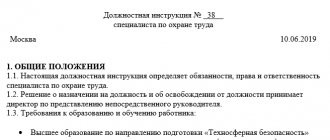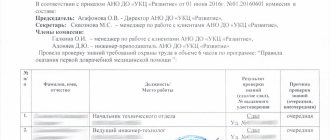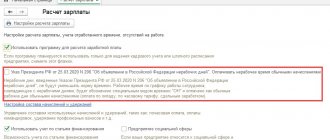Greetings, dear friends! Here you will find comprehensive information and materials (sample documents) about planning and financing occupational safety measures. Be patient, focus and have fun 
Based on Article 226 of the Labor Code of the Russian Federation, financing of measures to improve working conditions and labor protection by employers is carried out in the amount of at least 0.2 percent of the amount of costs for the production of products (works, services).
Since the cost price is the sum of the enterprise’s costs for the production and sale of products, to calculate the costs of financing measures to improve working conditions and labor protection, you can take the amount of the “cost of sales” line from the “Profit and Loss Statement” - form according to OKUD 0710002 (see Appendix No. 1 to the order of the Ministry of Finance of the Russian Federation dated July 2, 2010 No. 66n “On the forms of financial statements of organizations”).
The funding standard specified in Article 226 of the Labor Code does not apply to state unitary enterprises and federal institutions. To make it a little clearer, let’s understand the concepts.
In accordance with Art. 120 of the Civil Code of the Russian Federation, an institution is a non-profit organization created by the owner to carry out managerial, socio-cultural or other functions of a non-commercial nature. An institution can be created by the Russian Federation, a subject of the Russian Federation, or a municipal entity (state or municipal institution).
In accordance with paragraph 2 of Art. 9_1 of the Federal Law of January 12, 1996 No. 7-FZ “On Non-Profit Organizations”, the types of state and municipal institutions are recognized as autonomous, budgetary and state-owned.
In accordance with Art. 120 of the Civil Code of the Russian Federation, the procedure for financial support for the activities of state and municipal institutions is determined by law.
In accordance with paragraph 2 of Art. 161 of the Budget Code of the Russian Federation, financial support for the activities of a state-owned institution is carried out at the expense of the corresponding budget of the budget system of the Russian Federation and on the basis of budget estimates. Thus, the amount of funding for measures to improve labor conditions and safety in state government institutions is determined on the basis of budget estimates.
In accordance with Art. 4 of the Federal Law of November 3, 2006 No. 174-FZ “On Autonomous Institutions”, financial support for activities aimed at the development of autonomous institutions, the list of which is determined by the body exercising the functions and powers of the founder, is carried out through subsidies from the corresponding budget of the Russian budget system Federation.
Thus, the amount of funding for measures to improve conditions and labor protection in state government institutions is determined on the basis of the budget, and in state autonomous institutions it is determined by the body exercising the functions and powers of the founder.
In accordance with Articles 226 and 419 of the Labor Code of the Russian Federation and Article 5.27 of the Code of the Russian Federation on Administrative Offences, persons guilty of violating labor legislation and other acts containing labor law norms are subject to disciplinary and financial liability in the manner established by this Code and other federal laws, and are also brought to civil, administrative and criminal liability in the manner established by federal laws and if the employer finances measures to improve labor conditions and safety in the amount of less than 0.2 percent of the cost of production (work, services), administrative liability is provided for violation of labor and labor protection legislation, in accordance with Article 5.27 of the Code of Administrative Offenses of the Russian Federation - the imposition of an administrative fine on officials in the amount of one thousand to five thousand rubles; for legal entities - from thirty thousand to fifty thousand rubles.
Judicial practice on financing of labor protection measures
Insufficient funding for an institution is also not a basis for refusal to comply with state regulatory requirements for labor protection, which is confirmed in particular by the decision of November 3, 2015 in case No. 21-925/2015 of the Khabarovsk Regional Court.
From the case materials:
By a resolution of the state labor inspector of the State Labor Inspectorate in the Khabarovsk Territory dated May 28, 2020, the FKU imposed a fine in the amount of 120 thousand rubles for committing an administrative offense under Part 3 of Article 5.27_1 of the Code of Administrative Offenses of the Russian Federation.
A legal entity was brought to administrative responsibility for violating the requirements established by Articles 212, 213 of the Labor Code of the Russian Federation and Order of the Ministry of Health and Social Development of Russia dated April 12, 2011 No. 302n, namely: in the Federal Public Institution for various works related to harmful and (or) dangerous working conditions , as well as with the organization of public catering, 27 workers were allowed into the bakery and canteen, but they were not provided with mandatory preliminary and periodic medical examinations.
Applicant's position
A representative of the FKU filed a complaint with the Khabarovsk Regional Court, in which he asks to cancel the court decision and terminate the proceedings, citing the insignificance of the offense.
Court position
1. The Code of Administrative Offenses of the Russian Federation does not distinguish the forms of guilt of a legal entity.
The court indicated that, unlike individuals, the Code of Administrative Offenses of the Russian Federation does not distinguish forms of guilt in relation to legal entities, but only requires establishing that the legal entity had the opportunity to comply with the rules and regulations for violation of which administrative liability is provided, but they were not accepted all measures within his power to comply with them.
As noted by the court, the concept of guilt of a legal entity means the presence of a legal obligation that a legal entity must fulfill, the presence of an objective possibility of fulfilling this obligation, and failure to fulfill the obligation due to the person’s failure to take all measures depending on it.
The fault of the FKU, according to the position of the court, was the failure to take all measures depending on it to comply with the requirements of the current labor legislation for the proper organization of medical examinations of workers (the concept of guilt of a legal entity is disclosed in Article 2.1 of the Code of Administrative Offenses of the Russian Federation).
2. Insufficient funding is not a basis for exemption from administrative liability.
The court noted that the FKU’s indication of insufficient funding to fulfill the mandatory requirements established by law and regulations is not a basis for releasing the FKU from administrative liability, and therefore the punishment for the crime is a fine in an amount less than the minimum of the sanction provided for in Part 3 of the Article 5.27_1 of the Code of Administrative Offenses of the Russian Federation was fair.
3. Termination of proceedings due to the insignificance of the violation committed is a right, not an obligation of the court.
The court stated that when imposing the punishment, the circumstances of the case and the significant threat to protected social relations were taken into account. At the same time, the socially significant activities of the PKU in itself are not grounds for terminating the proceedings.
Let us note that, according to Article 2.9 of the Code of Administrative Offenses of the Russian Federation, if the administrative offense committed is of minor importance, the judge, body, official authorized to resolve the case of an administrative offense may release the person who committed the administrative offense from administrative liability and limit himself to an oral remark.
The court's decision
The decision of the Vaninsky District Court of the Khabarovsk Territory dated August 18, 2020 in the case of an administrative offense under Part 3 of Article 5.27_1 of the Code of Administrative Offenses of the Russian Federation, in relation to the FKU, was left unchanged, and the complaint of the legal representative of the FKU was not satisfied.
Expenses for special labor assessment
A special assessment of working conditions (SOUT) allows you to identify harmful and/or dangerous production factors, determine the level of their impact on the employee’s health and compare the actual values with accepted standards (Article 3 of the Federal Law of December 28, 2013 No. 426-FZ). Based on the results of the SOUT, the workplace is assigned one of the following classes:








